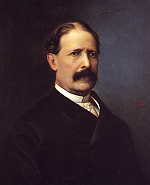Antonio Maria de Fontes Pereira de Melo
António Maria de Fontes Pereira de Melo (born September 8, 1819 in Lisbon , † January 22, 1887 ibid) was a Portuguese politician and statesman from the time of the Portuguese monarchy. He was a leader of the Regeneration Party , held various ministerial posts and was prime minister three times (1871–1878, 1879 and 1881–1886). He led one of the most stable governments in Portuguese history at that time and made a contribution to the modernization of the administration and the industrialization of the country. His reign went under the expression fontism ( Portuguese fontismo ) in Portuguese historiography.
Life
Fontes de Melo entered the military academy at the age of 12. In 1839 he followed his father, who was appointed governor of Cape Verde , to Praia . He married there and returned to Lisbon in 1843 after his father's term of office had ended.
In the civil war against the Setembrist counter-government in Porto , he fought on the side of the Duke of Saldanha .
In 1848 Fontes Pereira de Melo was elected MP for the Cape Verde Islands. Despite his opposition to Costa Cabral , who tried everything to prevent Fontes entry into the Cortes , Fontes managed to defend his mandate. During the second Costa Cabral government, Fontes rose to be one of the leading opposition politicians.
During the Saldanha government, Fontes was initially minister of the navy for a short time and then minister of finance. As such, he managed to put the state finances in order, and in particular to ensure that the civil servants were paid on time, which had not happened for a long time, and therefore earned him respect and great reputation. Fontes also took over the newly created Ministry of Public Works. In this role he made a special contribution to the expansion of the country's rail network.
Another problem facing the government was that Portugal had not been servicing its external debt for some time. Trading in Portuguese stocks was therefore banned on all major stock exchanges in Europe. Without this trade, however, it was not possible for the country to raise foreign capital, which was urgently needed to build up the industrial infrastructure. Fontes therefore went on a trip abroad, on which he was in London by Queen Victoria and in Paris by Emperor Napoléon III. was received. He succeeded in getting Portuguese securities to be traded again on the stock exchanges in London and Paris, but only against the promise to increase taxes in Portugal so that the state would have higher income to service its foreign debts. These higher taxes, which could only be enforced against great opposition, led to the fall of the Saldanha government in 1856.
In 1858/59 Fontes conducted negotiations with the Netherlands on the demarcation of the border between the colonial possessions of both countries on the Lesser Sunda Islands . They were concluded in 1859 with the signing of the Lisbon Treaty .
In 1859, when the Regeneration Party came back to government, Fontes joined the government as Minister of the Interior. When the Historical Party came to power again in 1861, also caused by the death of the previous Prime Minister, the Duke of Terceira , Fontes became leader of the opposition. In 1865, again Minister of Finance in de Aguiar's coalition government , then Minister of War.
In 1871 Fontes took up the post of Prime Minister for the first time. During this time he also kept the Ministry of War and took special care of the modernization of the Portuguese army. In terms of foreign policy, he ensured that Portugal maintained strict neutrality during the political turmoil that shook neighboring Spain at the time . Fonte's first government lasted until 1878, making it the most stable and longest in office of that time. In 1877 he lost a vote in parliament, resigned - officially for health reasons - and went on a long trip to Europe.
In 1878, when the subsequent de Ávila government was in trouble, the king reappointed him prime minister, which provoked sharp protests from the new Progressive Party . In 1879 he had to resign again and went into opposition to the new progressive government. From his new post as President of the House of Lords, he succeeded in overthrowing the government in 1881 and being appointed Prime Minister for the third time. During this time, Fontes mainly pushed through a constitutional amendment concerning the second chamber: the senators there, who had been able to inherit their posts up to now, were only appointed for life.
In 1886, the third government of Fontes overthrew and the progressives took power again. Fontes became opposition leader and was preparing the election campaign for the Regeneration Party when he died unexpectedly in Lisbon in 1887. António de Serpa Pimentel succeeded him as leader of the Regeneration Party.
| predecessor | Office | successor |
|---|---|---|
| António José de Ávila Antonio José de Ávila António Rodrigues Sampaio |
Prime Minister of Portugal 1871–1877 1879 1881–1886 |
António José de Ávila Anselmo José Braamcamp José Luciano de Castro |
| personal data | |
|---|---|
| SURNAME | Fontes Pereira de Melo, António Maria de |
| BRIEF DESCRIPTION | Portuguese politician and statesman |
| DATE OF BIRTH | September 8, 1819 |
| PLACE OF BIRTH | Lisbon |
| DATE OF DEATH | January 22, 1887 |
| Place of death | Lisbon |

